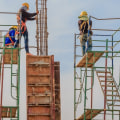Construction engineers play a pivotal role in the planning, design, and execution of construction projects. Their expertise lies in ensuring that structures are built safely, efficiently, and within budget. They bridge the gap between design and construction, acting as both technical experts and project managers. Understanding the major responsibilities of a construction engineer offers insight into how infrastructure projects come to life and the level of precision required to make them successful.
Planning and Design Coordination
One of the key responsibilities of a construction engineer is to collaborate with architects, structural engineers, and other stakeholders during the planning and design phase. They analyze blueprints and technical drawings to ensure the design meets project specifications, safety standards, and environmental regulations. Construction engineers also play a critical role in determining the materials and methods best suited for the project, considering factors like cost, durability, and sustainability.
Project Management and Oversight
A construction engineer often acts as the project manager, overseeing every stage of construction. This involves creating detailed project schedules, allocating resources, and coordinating with contractors and suppliers. Their goal is to ensure that the project progresses smoothly and adheres to the established timeline. They also monitor budgets closely, identifying potential cost overruns and finding solutions to mitigate them.
Ensuring Compliance with Safety Standards
Safety is a top priority in construction projects, and construction engineers are responsible for implementing and enforcing safety protocols on-site. They conduct regular inspections to identify potential hazards and ensure compliance with occupational safety standards. This responsibility extends to training workers on safe practices and ensuring that equipment is properly maintained and operated.
Supervising On-Site Construction Activities
Construction engineers spend a significant amount of time on-site, supervising various activities to ensure quality and accuracy. They verify that construction aligns with the design plans and make adjustments as needed. This hands-on involvement is critical in identifying and addressing any issues that arise during the construction process. Engineers must also coordinate with various tradespeople, such as plumbers, masons, and those providing essential electrician services, to ensure that all aspects of the project integrate seamlessly.
Problem-Solving and Decision-Making
Construction projects often encounter unexpected challenges, such as delays, design flaws, or adverse weather conditions. Construction engineers are tasked with identifying these issues quickly and developing effective solutions. Their ability to make informed decisions under pressure is crucial in keeping the project on track and avoiding costly setbacks.
Quality Assurance and Testing
Another major responsibility of a construction engineer is to ensure the quality of materials and workmanship. They conduct tests and inspections to verify that materials meet specified standards and that construction methods are executed correctly. This includes testing the strength of concrete, the stability of structures, and the functionality of systems such as HVAC and electrical wiring.
Managing Environmental and Regulatory Requirements
Construction engineers must also navigate complex regulatory landscapes, ensuring that projects comply with local building codes, zoning laws, and environmental regulations. This includes obtaining permits, conducting environmental impact assessments, and implementing measures to minimize the ecological footprint of the project. Their role is critical in balancing development with sustainability.
Communication and Collaboration
Effective communication is at the core of a construction engineer’s role. They act as a liaison between different stakeholders, including clients, contractors, and regulatory authorities. Clear communication ensures that everyone involved in the project is aligned on goals, timelines, and expectations. This responsibility extends to providing regular updates and reports to stakeholders, highlighting progress and addressing any concerns.
Leveraging Technology in Construction Engineering
The modern construction engineer also relies on advanced technologies to enhance efficiency and precision. Tools like Building Information Modeling (BIM) and project management software enable engineers to visualize projects in 3D, manage timelines, and coordinate complex workflows. These technologies help construction engineers anticipate and solve potential issues before they arise, reducing delays and improving overall project outcomes.
Conclusion: The Multifaceted Role of Construction Engineers
The responsibilities of a construction engineer are diverse and multifaceted, encompassing everything from planning and design to on-site supervision and problem-solving also with partnering with companies like Haltex for plumbing concerns. Their expertise ensures that construction projects are not only structurally sound but also completed on time and within budget. By managing safety, quality, and compliance, construction engineers play a vital role in shaping the built environment. Whether it’s a towering skyscraper or a community bridge, the success of these projects often depends on the skills and dedication of the construction engineer.






